Will Pfeifer's Blog, page 26
May 15, 2014
Words on Film Part 1: 'Studies in the Horror Film: Videodrome'
In yet another attempt to get some content on this blog, I'm going to share some of my many (many, many) books about movies in a series of posts. Unless my usual logorrhea kicks in, I'm hoping to keep these short and sweet -- just enough information to make you want to track down a copy of your own.
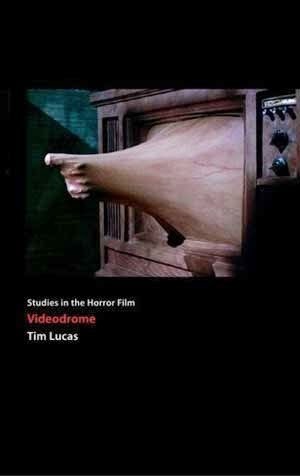
I pulled this one down off the shelf after reading the extensive coverage of David Cronenberg's "Videodrome" over at The Dissolve. It's always been one of my favorite movies, and Tim Lucas' book is a thorough and thoughtful look at its making, actually written back in the early 1980s when Cronenberg and company were making the film. Most of the book was slated for a special issue of Cinefantastique, then was scrapped when "Videodrome" failed to become the hit the magazine expected it to be.
Thankfully, it's all been collected here -- accounts of the making, interviews with the principal players (including David Cronenberg, James Woods and Debbie Harry) and other bits and pieces compiled by Lucas back in the day. There's also material written recently, allowing Lucas to offer some perspective on both the movie itself and his original articles. It's great stuff, especially if you're a fan of the movie or Cronenberg (one of the most thoughtful filmmakers working today, and a guy who's always a pleasure to read interviewed.) If you fall into either category, I highly recommend getting a copy of this book -- but be prepared to pay dearly. Even though it's only six years old, it's already selling for almost a C-note over on Amazon.

I pulled this one down off the shelf after reading the extensive coverage of David Cronenberg's "Videodrome" over at The Dissolve. It's always been one of my favorite movies, and Tim Lucas' book is a thorough and thoughtful look at its making, actually written back in the early 1980s when Cronenberg and company were making the film. Most of the book was slated for a special issue of Cinefantastique, then was scrapped when "Videodrome" failed to become the hit the magazine expected it to be.
Thankfully, it's all been collected here -- accounts of the making, interviews with the principal players (including David Cronenberg, James Woods and Debbie Harry) and other bits and pieces compiled by Lucas back in the day. There's also material written recently, allowing Lucas to offer some perspective on both the movie itself and his original articles. It's great stuff, especially if you're a fan of the movie or Cronenberg (one of the most thoughtful filmmakers working today, and a guy who's always a pleasure to read interviewed.) If you fall into either category, I highly recommend getting a copy of this book -- but be prepared to pay dearly. Even though it's only six years old, it's already selling for almost a C-note over on Amazon.
Published on May 15, 2014 19:25
May 4, 2014
Movies I Watched in April
Typically eclectic month, with an Oscar nominee, not one but two theatrical releases and the usual assortment of offbeat and or ancient obscurities.
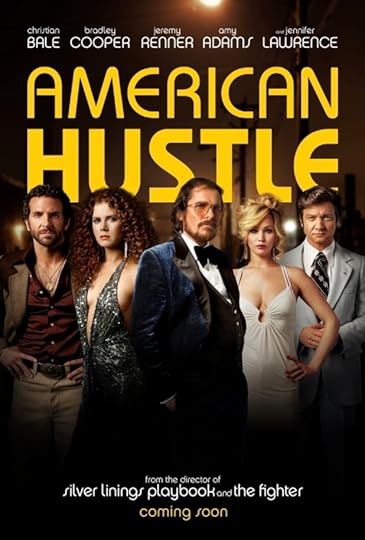
I'm still not sure why this was one of the big critical and award darlings of last year (unless it was riding in the wake of "Silver Linings Playbook," which leads to the question of why everyone loved that movie so much). Anyway, it was certainly entertaining in a sub-Scorsese way, with plenty of gloriously terrible '70s fashions and fun performances from Christian Bale, Amy Adams and the rest of the crew. I did enjoy the third-act switcheroo, which I'll admit I didn't see coming -- and any soundtrack with Jeff Lynne on it is going to get at least a little love from this guy whose first cassette tape was ELO's "Time."
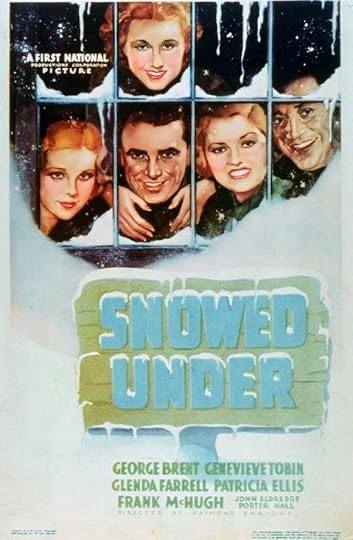
Like I've said before, the best thing about Turner Classic Movies (which, I've said before, is the best cable channel ever) isn't the frequent showings of "Casablanca" and "Gone With the Wind." It's the less frequent showings of movies like "Snowed Under," a 1936 obscurity about a playwright (George Brent) who retreats to a snowbound cottage to finish his latest play. Naturally, despite the Shining-esque setup, hijinks ensue, mostly in the form of various ex-wives and would-be girlfriends, and everything works out perfectly in the end. It's not great -- or classic -- by any means, but it has an offbeat setting and the sort of fast-paced, sitcom/farce plot you just don't see these days. Or, frankly, haven't seen since, say, 1936.
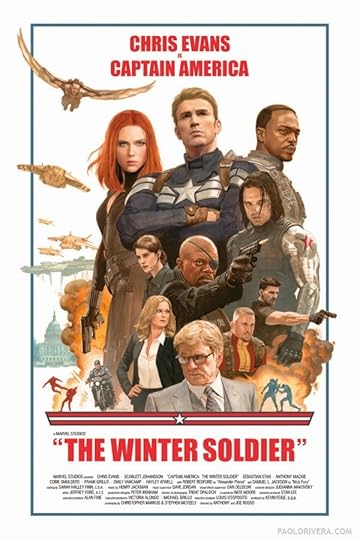
Like everyone else says, it's a very good superhero movie, combining the sort of big budget action and human elements these Marvel movies have practically trademarked with a genuinely involving 1970s conspiracy plot. The presence of Robert Redford, veteran of "Three Days of the Condor" and "All the President's Men" only serves to reinforce the connection, but as with "Captain America: The First Avenger," the star of the show here is Chris Evans, bringing a genuine sense of decency to the role of a good man out of his time trying to still do some good. I didn't enjoy this Cap adventure quite as much as his last one, mostly because I'm a big sucker for World War II-era nostalgia, but "The Winter Soldier" is one of Marvel's best efforts, and I can't wait to see what they've got planned for Cap next. By the way, the scenes of Redford's character walking in his skyscraper office made me realize just how huge the Hollywood legend's head really is.)
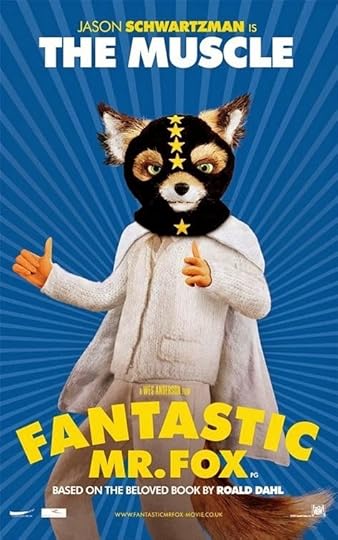
Yes, Allie wanted to watch it again. And yes, it's still good. And, mostly importantly, it's not "Frozen."
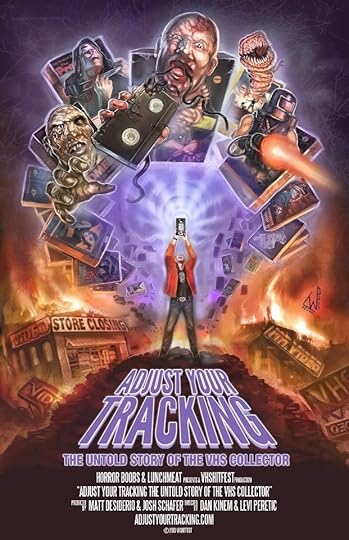
My friends, we live in a wonderful time when there are not one but two documentaries about obsessive VHS tape collectors. "Adjust Your Tracking" lacks the organization and vision of the other one, "Rewind This," but it's scrappier and more chaotic, which isn't necessarily a bad thing when you're talking about this sort of subject matter. I especially enjoyed the segment devoted to the guy who set up a perfect replica of a video store in his basement, complete with mouse-less computer and vintage counter. Also, though I'd heard of the legendarily awful anthology movie, "Tales from the Quadead Zone," I had no idea actual tapes of this atrocity cost hundreds of dollars -- or that it was so jaw-droppingly bad. Time to start haunting the tape shelves of the local Salvation Army.
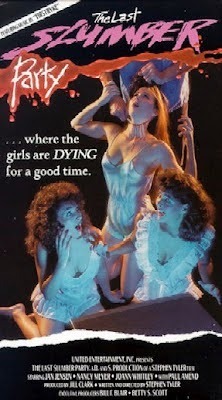
Inspired by the rapturous write-up in this book, I tracked down a copy of this forgotten 1988 slasher and popped it in the player. Thankfully, it was just as strangely terrible as promised. Your standard slumber party slasher setup gets a surreal jolt of energy from the godawful performances, nonsensical plot and not one, not two but three bizarre endings. Most 1980s slasher movies leave me bored to tears, but this movie -- as genuinely boring as it was -- kept me grimly fascinating from its cheap opening credits to the final frame of its (third) ending shot. You have to be a special breed of horror fan to endure, much less enjoy, a movie like this, but to no one's surprise, I fall squarely in that category.
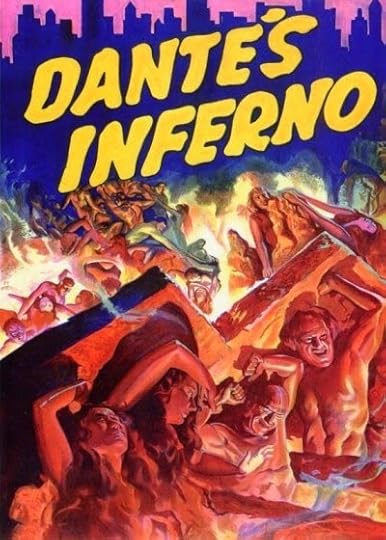
One of my favorite 1930s movies, and one that never shows up on Turner Classics. (I caught it on the Fox Movie Channel, which is where it airs infrequently -- though it did just arrive on a DVD.) Spencer Tracy plays a genuine bastard, the sort of role he wouldn't play a few years later when he became a huge and beloved star. After quitting his job on a ship, he lands a job in a carnival getting hit in the face with baseballs (in blackface, no less!) before taking over promotion and management of an attraction based on (what else?) Dante's "Inferno." He jazzes it up with sexy costumes and lurid displays, then builds an empire by screwing over his friends and cutting corners on construction. It all comes to a head on his gambling ship, which runs into disaster when a fire breaks out. "Dante's Inferno" was a big budget release back in 1935, and it shows, with amazing footage of the Inferno attraction and the fiery ship. Plus, as a bonus, you get a supporting performance from the great Claire Trevor, a small role for Our Ganger Scotty Beckett and a dance sequence showcasing a very young Rita Cansino, who would be better known in a few years as Rita Hayworth.
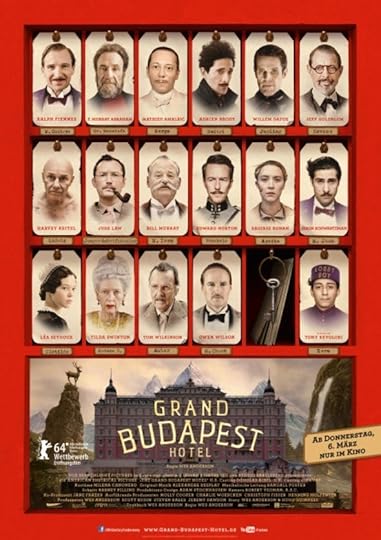
Two theatrical movies in one month, and as good as "Captain America: The Winter Soldier" was, it couldn't compare to this bit of wonder from Wes Anderson. Taking his penchant for world-building to the extreme, "Grand Budapest Hotel" is so full of striking visual elements and beautifully hand-crafted bits of business that I know I'm going to have to watch it several more times just to absorb it all. Thankfully, that'll be a pleasure because this ranks with the best movies on Anderson's CV (and, let's face it, they're all very good). The biggest surprise? How funny Ralph Fiennes can be, delivering a bravura, high-energy performance in what amounts to a 1930s style comic version of "Grand Hotel," but with an even more complicated plot and a three (three!) level framing sequence. And, this being a Wes Anderson movie, those laughs are anchored in something fairly serious -- including references to the Nazi occupation of Europe and, in a more timeless vein, the idea that simple acts of decency and courtesy can be the most important thing in the entire world.

I'm still not sure why this was one of the big critical and award darlings of last year (unless it was riding in the wake of "Silver Linings Playbook," which leads to the question of why everyone loved that movie so much). Anyway, it was certainly entertaining in a sub-Scorsese way, with plenty of gloriously terrible '70s fashions and fun performances from Christian Bale, Amy Adams and the rest of the crew. I did enjoy the third-act switcheroo, which I'll admit I didn't see coming -- and any soundtrack with Jeff Lynne on it is going to get at least a little love from this guy whose first cassette tape was ELO's "Time."

Like I've said before, the best thing about Turner Classic Movies (which, I've said before, is the best cable channel ever) isn't the frequent showings of "Casablanca" and "Gone With the Wind." It's the less frequent showings of movies like "Snowed Under," a 1936 obscurity about a playwright (George Brent) who retreats to a snowbound cottage to finish his latest play. Naturally, despite the Shining-esque setup, hijinks ensue, mostly in the form of various ex-wives and would-be girlfriends, and everything works out perfectly in the end. It's not great -- or classic -- by any means, but it has an offbeat setting and the sort of fast-paced, sitcom/farce plot you just don't see these days. Or, frankly, haven't seen since, say, 1936.

Like everyone else says, it's a very good superhero movie, combining the sort of big budget action and human elements these Marvel movies have practically trademarked with a genuinely involving 1970s conspiracy plot. The presence of Robert Redford, veteran of "Three Days of the Condor" and "All the President's Men" only serves to reinforce the connection, but as with "Captain America: The First Avenger," the star of the show here is Chris Evans, bringing a genuine sense of decency to the role of a good man out of his time trying to still do some good. I didn't enjoy this Cap adventure quite as much as his last one, mostly because I'm a big sucker for World War II-era nostalgia, but "The Winter Soldier" is one of Marvel's best efforts, and I can't wait to see what they've got planned for Cap next. By the way, the scenes of Redford's character walking in his skyscraper office made me realize just how huge the Hollywood legend's head really is.)

Yes, Allie wanted to watch it again. And yes, it's still good. And, mostly importantly, it's not "Frozen."

My friends, we live in a wonderful time when there are not one but two documentaries about obsessive VHS tape collectors. "Adjust Your Tracking" lacks the organization and vision of the other one, "Rewind This," but it's scrappier and more chaotic, which isn't necessarily a bad thing when you're talking about this sort of subject matter. I especially enjoyed the segment devoted to the guy who set up a perfect replica of a video store in his basement, complete with mouse-less computer and vintage counter. Also, though I'd heard of the legendarily awful anthology movie, "Tales from the Quadead Zone," I had no idea actual tapes of this atrocity cost hundreds of dollars -- or that it was so jaw-droppingly bad. Time to start haunting the tape shelves of the local Salvation Army.

Inspired by the rapturous write-up in this book, I tracked down a copy of this forgotten 1988 slasher and popped it in the player. Thankfully, it was just as strangely terrible as promised. Your standard slumber party slasher setup gets a surreal jolt of energy from the godawful performances, nonsensical plot and not one, not two but three bizarre endings. Most 1980s slasher movies leave me bored to tears, but this movie -- as genuinely boring as it was -- kept me grimly fascinating from its cheap opening credits to the final frame of its (third) ending shot. You have to be a special breed of horror fan to endure, much less enjoy, a movie like this, but to no one's surprise, I fall squarely in that category.

One of my favorite 1930s movies, and one that never shows up on Turner Classics. (I caught it on the Fox Movie Channel, which is where it airs infrequently -- though it did just arrive on a DVD.) Spencer Tracy plays a genuine bastard, the sort of role he wouldn't play a few years later when he became a huge and beloved star. After quitting his job on a ship, he lands a job in a carnival getting hit in the face with baseballs (in blackface, no less!) before taking over promotion and management of an attraction based on (what else?) Dante's "Inferno." He jazzes it up with sexy costumes and lurid displays, then builds an empire by screwing over his friends and cutting corners on construction. It all comes to a head on his gambling ship, which runs into disaster when a fire breaks out. "Dante's Inferno" was a big budget release back in 1935, and it shows, with amazing footage of the Inferno attraction and the fiery ship. Plus, as a bonus, you get a supporting performance from the great Claire Trevor, a small role for Our Ganger Scotty Beckett and a dance sequence showcasing a very young Rita Cansino, who would be better known in a few years as Rita Hayworth.

Two theatrical movies in one month, and as good as "Captain America: The Winter Soldier" was, it couldn't compare to this bit of wonder from Wes Anderson. Taking his penchant for world-building to the extreme, "Grand Budapest Hotel" is so full of striking visual elements and beautifully hand-crafted bits of business that I know I'm going to have to watch it several more times just to absorb it all. Thankfully, that'll be a pleasure because this ranks with the best movies on Anderson's CV (and, let's face it, they're all very good). The biggest surprise? How funny Ralph Fiennes can be, delivering a bravura, high-energy performance in what amounts to a 1930s style comic version of "Grand Hotel," but with an even more complicated plot and a three (three!) level framing sequence. And, this being a Wes Anderson movie, those laughs are anchored in something fairly serious -- including references to the Nazi occupation of Europe and, in a more timeless vein, the idea that simple acts of decency and courtesy can be the most important thing in the entire world.
Published on May 04, 2014 19:44
April 16, 2014
Buy My Comics, Make Me Rich: RED HOOD AND THE OUTLAWS #30
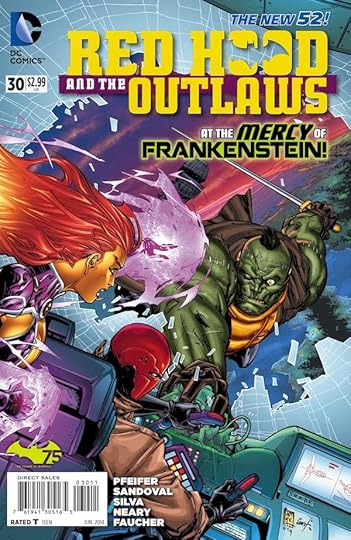
Yes, I'm writing the new TEEN TITANS title that debuts this summer, but for the moment, the focus is still on those slightly older superheroes, Red Hood and the Outlaws. Out today is the second part of my three-part run on the title, which pits Roy and Kori against Frankenstein (of FRANKENSTEIN AND THE AGENTS OF S.H.A.D.E) and Roy against those aliens who just won't stay down -- plus a certain special guest star.
Read a sneak preview of it here!
Published on April 16, 2014 04:06
April 8, 2014
Great Moments In Comics, Part 40
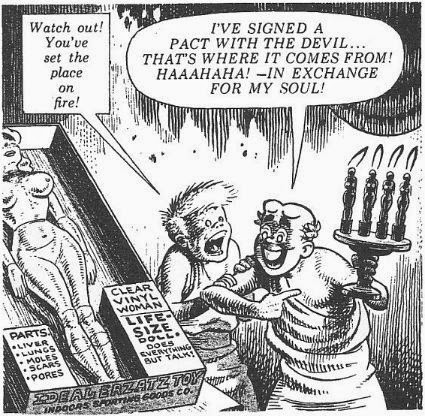
Archie reveals that he sold his soul to the Devil.
"Goodman Goes Playboy," Help, Feb. 1962, script by Harvey Kurtzman, art by Will Elder
Published on April 08, 2014 17:48
April 4, 2014
Movies I Watched in March
Not a whole lot of movies viewed last month, but I think I get bonus points for the sheer strangeness of a few of them, including this exploitative little gem...
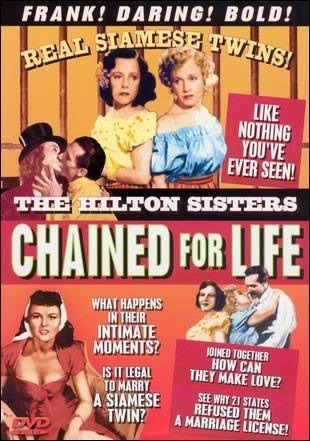
You may remember the Hilton sisters from Tod Browning's classic film 1932 "Freaks," in which they played conjoined twins, which is exactly what they were in real life. This low-budget quickie was made two decades later, and Daisy and Violet look every day older of those 20 years. I imagine earning a living on the carnival circuit was a tough life, and I'm sure the sisters were hoping this movie would earn them a few bucks. Trouble is, it's both too convoluted and too simple to be entertaining, and it never comes close to approaching the twisted brilliance of Browning's film. The sisters play, essentially, themselves, conjoined twins with a mediocre nightclub act. When a sleazy lothariot plots to marry one of them, things go horribl wrong. The whole movie is told through an awkward double flashback structure, with the judge flashing back to the trial, which then flashes back to the events of the movie. It's deadly dull and incredibly cheap (with a sad, late-career appear by Warner Bros. stalwart Allen Jenkins), but there is one memorable sequence where one of the sisters has a dream where she's separated from her sibling and dances gracefully in a field. It's obvious a double is being used (how else could they shoot the scene?) but as crude as it is, it has a real emotional punch and, in its few seconds, addresses the issues of the film more powerfully than the rest of the crude melodrama.
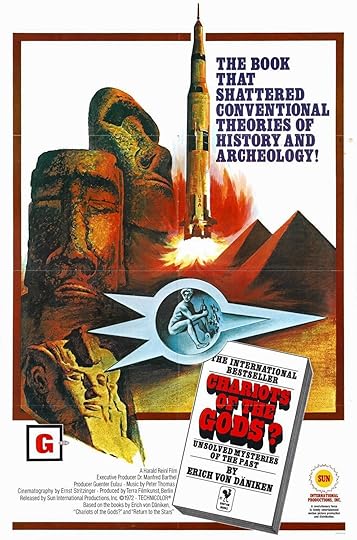
This sort of movie was a big deal when I was a kid, in the era of "In Search Of" and Scholastic paperbacks introducing us to such arcane concepts as the Loch Ness Monster, bigfoot and ancient astronauts. Though it blew my mind back then, it's pretty obvious to these cynical, skeptical eyes that, as entertaining as it, it's a prime slice of vintage 1970s bullshit. A lot of fun, though, and way better than the too-slick ripoffs of this sort of thing that clog virtually every cable channel in the free world.
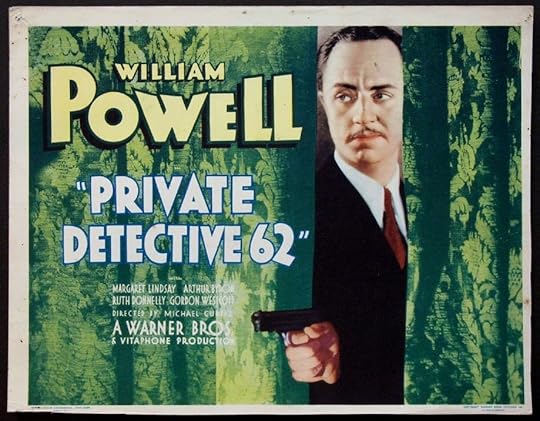
Seriously, how great is William Powell? He never seems to get mentioned among the top rank Hollywood movie stars -- your Gables, your Bogarts, your Stewarts, your Coopers -- but I'd argue he's right up there with them, starring in movies from the silents to the 1950s, with nary a bad one among them, and more than a few classics (including "The Thin Man," "My Man Godfrey" and "Mister Roberts") on his resume. This film, a 1933 pre-Coder, isn't on that level, but it is entertaining, with Powell playing a smooth operator with a solid moral streak who fights back against the corrupt detective he's working for. Fun and fast-paced (it's a mere 66 minutes long) in the way only an early 1930s Warner Bros. movie can be, it's definitely worth a look the next time it inevitably airs on Turner Classic Movies.
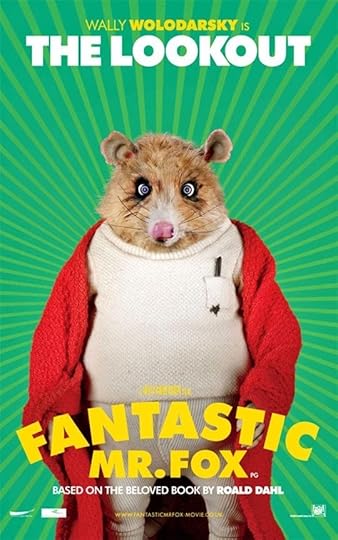
This one's been mentioned for the past couple of months, and as much as I love it, I don't have a heck of a lot more to say. Allie's the one who keeps requesting it, and I remain grateful, because she's got a Monster High DVD she hasn't watched yet, and I know when that gets popped into the DVD player, it's going to be all sorts of agony for dad. So as long as she keeps asking for high-quality stop-motion comedy dramas from Wes Anderson, I am more than happy to oblige.
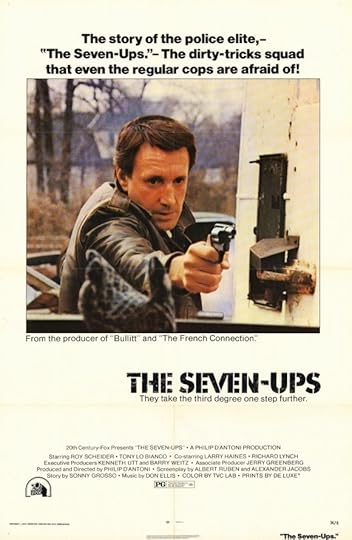
I checked this one out when it aired on TCM a few weeks ago. I'd never seen the film the whole way through, and I love "The French Connection," a movie it gets compared with a lot (and for good reason -- both star Roy Scheider and Tony Lo Bianco, both take place on the mean streets of early 1970s New York, both feature wild car chases and -- most tellingly -- this one was released two years later in an obvious attempt to replicate the blockbuster success of "The French Connection." Sadly, it doesn't succeed. While "The French Connection" feels driven and relentless even in its quieter moments (thanks mostly to the balls-out performance of the great Gene Hackman), "The Seven-Ups" has some stretches of real boredom. Scheider is good, as always, and the grimy Big Apple locations are fascinating, but I don't think I'll be revisiting this one anytime soon. "The French Connection," though -- hell, I feel like watching that again right now.
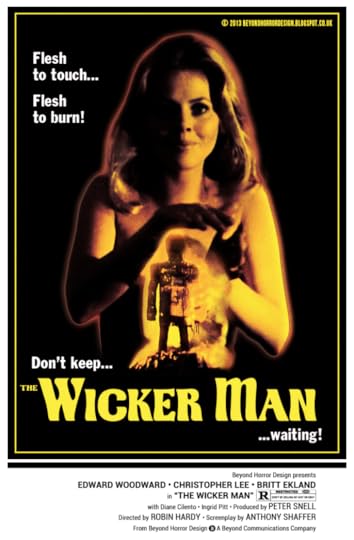
It always amazes me how a movie that takes place almost entirely in broad daylight and features more than a bit of sly humor can manage to generate so much gut-wrenching tension by the final scene. This one's considered a true horror classic, and with good reason. The performances are all perfectly pitched and add to the sense of paranoia, and the plot is so intricately worked out that its sheer brilliant malevolence is scary all by itself. And that ending. Oh, that ending. One thought struck me while watching "The Wicker Man" this time around: It really is one of the best, most thoughtful movies about religion I've ever seen -- mostly because it does more than just focus on one religion like most movies do (and, in most movies, that religion is, of course, Christianity). Anthony Schaffer's screenplay is ambitious enough to compare and contrast Sgt. Howie's (Edward Woodward) devotion to Christianity with the villager's decidedly more pagan beliefs. Both sides make their respective points, and even though one of them definitely comes out ahead at the end, the other side never gives up its faith -- something I think would happen in a lesser -- and less intelligent -- film.

You may remember the Hilton sisters from Tod Browning's classic film 1932 "Freaks," in which they played conjoined twins, which is exactly what they were in real life. This low-budget quickie was made two decades later, and Daisy and Violet look every day older of those 20 years. I imagine earning a living on the carnival circuit was a tough life, and I'm sure the sisters were hoping this movie would earn them a few bucks. Trouble is, it's both too convoluted and too simple to be entertaining, and it never comes close to approaching the twisted brilliance of Browning's film. The sisters play, essentially, themselves, conjoined twins with a mediocre nightclub act. When a sleazy lothariot plots to marry one of them, things go horribl wrong. The whole movie is told through an awkward double flashback structure, with the judge flashing back to the trial, which then flashes back to the events of the movie. It's deadly dull and incredibly cheap (with a sad, late-career appear by Warner Bros. stalwart Allen Jenkins), but there is one memorable sequence where one of the sisters has a dream where she's separated from her sibling and dances gracefully in a field. It's obvious a double is being used (how else could they shoot the scene?) but as crude as it is, it has a real emotional punch and, in its few seconds, addresses the issues of the film more powerfully than the rest of the crude melodrama.

This sort of movie was a big deal when I was a kid, in the era of "In Search Of" and Scholastic paperbacks introducing us to such arcane concepts as the Loch Ness Monster, bigfoot and ancient astronauts. Though it blew my mind back then, it's pretty obvious to these cynical, skeptical eyes that, as entertaining as it, it's a prime slice of vintage 1970s bullshit. A lot of fun, though, and way better than the too-slick ripoffs of this sort of thing that clog virtually every cable channel in the free world.

Seriously, how great is William Powell? He never seems to get mentioned among the top rank Hollywood movie stars -- your Gables, your Bogarts, your Stewarts, your Coopers -- but I'd argue he's right up there with them, starring in movies from the silents to the 1950s, with nary a bad one among them, and more than a few classics (including "The Thin Man," "My Man Godfrey" and "Mister Roberts") on his resume. This film, a 1933 pre-Coder, isn't on that level, but it is entertaining, with Powell playing a smooth operator with a solid moral streak who fights back against the corrupt detective he's working for. Fun and fast-paced (it's a mere 66 minutes long) in the way only an early 1930s Warner Bros. movie can be, it's definitely worth a look the next time it inevitably airs on Turner Classic Movies.

This one's been mentioned for the past couple of months, and as much as I love it, I don't have a heck of a lot more to say. Allie's the one who keeps requesting it, and I remain grateful, because she's got a Monster High DVD she hasn't watched yet, and I know when that gets popped into the DVD player, it's going to be all sorts of agony for dad. So as long as she keeps asking for high-quality stop-motion comedy dramas from Wes Anderson, I am more than happy to oblige.

I checked this one out when it aired on TCM a few weeks ago. I'd never seen the film the whole way through, and I love "The French Connection," a movie it gets compared with a lot (and for good reason -- both star Roy Scheider and Tony Lo Bianco, both take place on the mean streets of early 1970s New York, both feature wild car chases and -- most tellingly -- this one was released two years later in an obvious attempt to replicate the blockbuster success of "The French Connection." Sadly, it doesn't succeed. While "The French Connection" feels driven and relentless even in its quieter moments (thanks mostly to the balls-out performance of the great Gene Hackman), "The Seven-Ups" has some stretches of real boredom. Scheider is good, as always, and the grimy Big Apple locations are fascinating, but I don't think I'll be revisiting this one anytime soon. "The French Connection," though -- hell, I feel like watching that again right now.

It always amazes me how a movie that takes place almost entirely in broad daylight and features more than a bit of sly humor can manage to generate so much gut-wrenching tension by the final scene. This one's considered a true horror classic, and with good reason. The performances are all perfectly pitched and add to the sense of paranoia, and the plot is so intricately worked out that its sheer brilliant malevolence is scary all by itself. And that ending. Oh, that ending. One thought struck me while watching "The Wicker Man" this time around: It really is one of the best, most thoughtful movies about religion I've ever seen -- mostly because it does more than just focus on one religion like most movies do (and, in most movies, that religion is, of course, Christianity). Anthony Schaffer's screenplay is ambitious enough to compare and contrast Sgt. Howie's (Edward Woodward) devotion to Christianity with the villager's decidedly more pagan beliefs. Both sides make their respective points, and even though one of them definitely comes out ahead at the end, the other side never gives up its faith -- something I think would happen in a lesser -- and less intelligent -- film.
Published on April 04, 2014 21:29
March 18, 2014
Buy my comics, make me rich: RED HOOD AND THE OUTLAWS #29
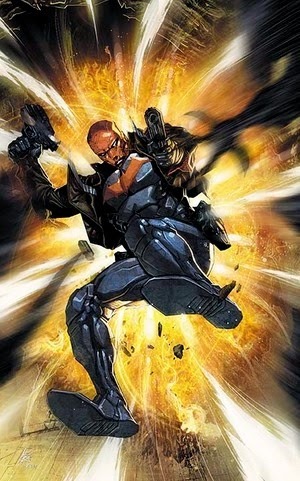
Been a while since I've written one of these blog posts, but rest assured that on Wednesday, March 19, there will indeed be a comic book on the shelves with my name in the credit box. It's issue 29 of DC's RED HOOD AND THE OUTLAWS, and it features bee-yooo-tiful art from Rafa Sandoval (seriously, kids, these images are going to blow your mind) and a seriously striking cover (see above) from Philip Tan. The story focuses on Roy, Jason and Kori, and features some truly offbeat aliens in the adversarial role. I had a lot of fun writing it, and I'm guessing you'll have some fun reading it. If you do happen to pick up a copy, as always, your comments are welcome in this blog. Lemme know what you thought!
Published on March 18, 2014 19:18
March 9, 2014
Movies I Watched in February
Coming under the heading of "Better Late than Never"...
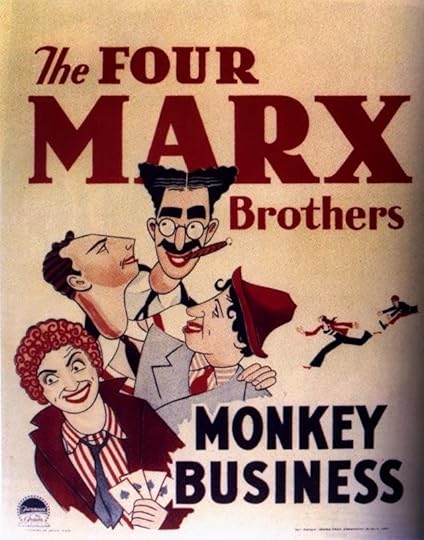
Allie's Marx Brother fixation continues, and I couldn't be happier. This is currently her favorite of the classic Paramount Marx movie, with the boys starting the film as stowaways on some sort of ocean voyage, then getting mixed up with surprisingly good-natured mobster Joe Helton, eventually saving his daughter from rival mobster Alkie Briggs. Naturally, none of it makes much sense, but there are some great set pieces, including a sequence where all four Marxes try to sneak off the ship using Maurice Chevalier's stolen passport and a series of increasingly preposterous Chevalier impressions. (When Harpo starting singing in Chevalier's voice, Allie thought she had finally heard her favorite Marx Brother speak, until seeing that it was actually a phonograph strapped to his back.)
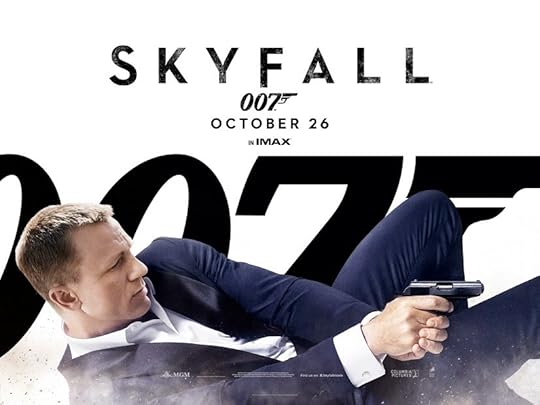
Having grown up with the glorious cheesiness of the James Bond movies, it's almost startling when one takes itself semi-seriously and plays upon the history of the hero, both for plot points and to add some weight to the story. This one is going to be tough to top for a lot of reasons -- the death of a major character, the introduction of at least two more (though one is, strictly speaking, a new version of that departed character) and the whole feeling of Bond coming to the end of his run. Plus, thanks to the cinematography of the great Roger Deakins, this thing just looks amazing, from the first frame to the last.
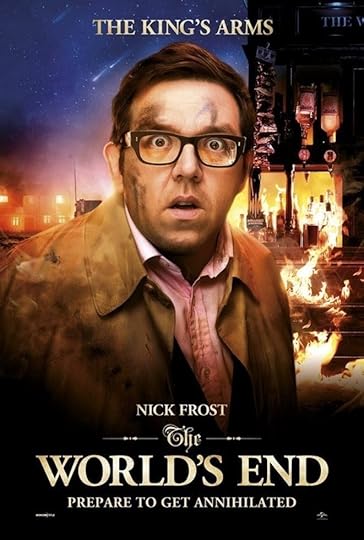
I didn't see most of the major movies of last year, I'll admit, but it's hard for me to think of one that would top this effort from Edgar Wright and Simon Pegg. A flawless mixture of comedy, human drama and suspenseful science fiction, in a perfect world it would be both a global hit and a nominee for Best Picture. I mean, what else do you need? The characters are richly drawn and consistently surprising, the comedy is pitch perfect and hits every note and the movie takes on some big issues -- aging, gentrification, sobriety, the meaning of life and freedom, etc. At least as good as "Shaun of the Dead" and "Hot Fuzz," and believe me, that's saying something.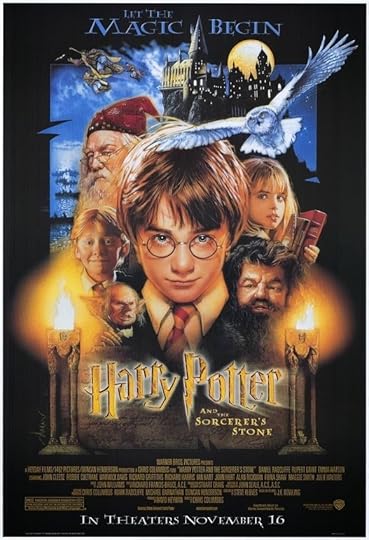
It's been a long, long time since I saw this one in the theater, but we figured we'd introduce Allie to the boy wizard. Couple of observations: The movie isn't exactly bad, but it's not exactly good either. It's the fun concepts of the book itself and nothing in the movie that makes it entertaining. (The movies themselves wouldn't really get good until Alfonso Cuaron took over directing duties with the third film.) And, as you might have guessed, all that CGI has aged rather poorly. Also, the movie spends so much time introducing those intriguing elements -- the train, the kids, the school, the cloak -- that the plot itself sort of pops up about 3/4 of the way through, too late to really care a whole lot about what's happening. The best thing about the film, though, might've been the most difficult element to nail -- the cast is excellent across the board, and over the course of the other six movies, they'd only get better.
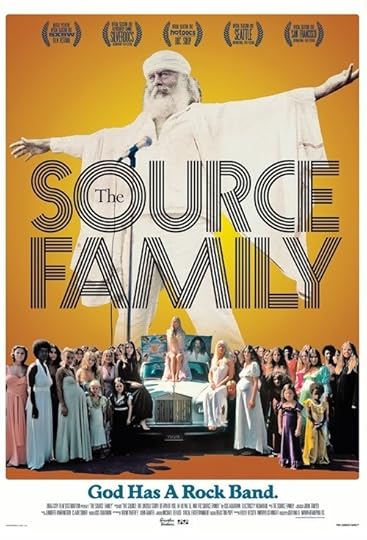
Fascinating documentary about The Source Family, a sort of cultish gathering of hippie-types who tried to found an ideal living community in 1970 Los Angeles. Thankfully, they never went the way the Mansons. Instead, they ran an insanely profitable health food restaurant on the Sunset Strip that not only attracted most of the big name celebrities of the day, it was also famous as the place Woody Allen visits at the end of "Annie Hall" and orders (in one of my favorite movie lines ever) "a plate of mashed yeast." This doc covers the entire history of the group, from it's restaurant-based roots to the current day, when its members look back on their past with a mixture of hazy nostalgia and bemused wonder.
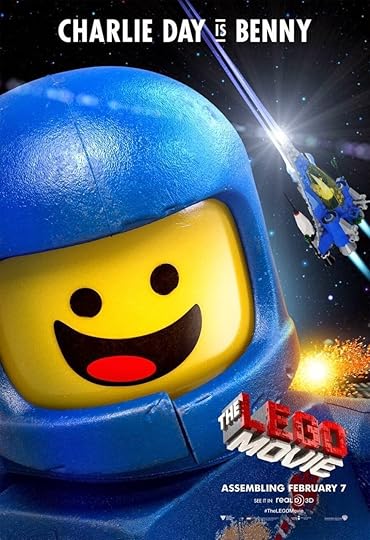
Damned good! I expected it to be a lot of fun, coming from Phil Lord and Christopher Miller, the guys behind "Cloudy with a Chance of Meatballs," but I don't know if I expected it to be this good, combining laugh-out-loud comedy with some solid emotional moments and even a touch of reality-bending mysticism. I don't want to give away any spoilers -- seriously, check this one out -- but there was at least one cameo I was hoping for but not expecting at all, and the ending went in a direction I couldn't see coming at all. Like the song says, everything is awesome.

Allie's Marx Brother fixation continues, and I couldn't be happier. This is currently her favorite of the classic Paramount Marx movie, with the boys starting the film as stowaways on some sort of ocean voyage, then getting mixed up with surprisingly good-natured mobster Joe Helton, eventually saving his daughter from rival mobster Alkie Briggs. Naturally, none of it makes much sense, but there are some great set pieces, including a sequence where all four Marxes try to sneak off the ship using Maurice Chevalier's stolen passport and a series of increasingly preposterous Chevalier impressions. (When Harpo starting singing in Chevalier's voice, Allie thought she had finally heard her favorite Marx Brother speak, until seeing that it was actually a phonograph strapped to his back.)

Having grown up with the glorious cheesiness of the James Bond movies, it's almost startling when one takes itself semi-seriously and plays upon the history of the hero, both for plot points and to add some weight to the story. This one is going to be tough to top for a lot of reasons -- the death of a major character, the introduction of at least two more (though one is, strictly speaking, a new version of that departed character) and the whole feeling of Bond coming to the end of his run. Plus, thanks to the cinematography of the great Roger Deakins, this thing just looks amazing, from the first frame to the last.

I didn't see most of the major movies of last year, I'll admit, but it's hard for me to think of one that would top this effort from Edgar Wright and Simon Pegg. A flawless mixture of comedy, human drama and suspenseful science fiction, in a perfect world it would be both a global hit and a nominee for Best Picture. I mean, what else do you need? The characters are richly drawn and consistently surprising, the comedy is pitch perfect and hits every note and the movie takes on some big issues -- aging, gentrification, sobriety, the meaning of life and freedom, etc. At least as good as "Shaun of the Dead" and "Hot Fuzz," and believe me, that's saying something.

It's been a long, long time since I saw this one in the theater, but we figured we'd introduce Allie to the boy wizard. Couple of observations: The movie isn't exactly bad, but it's not exactly good either. It's the fun concepts of the book itself and nothing in the movie that makes it entertaining. (The movies themselves wouldn't really get good until Alfonso Cuaron took over directing duties with the third film.) And, as you might have guessed, all that CGI has aged rather poorly. Also, the movie spends so much time introducing those intriguing elements -- the train, the kids, the school, the cloak -- that the plot itself sort of pops up about 3/4 of the way through, too late to really care a whole lot about what's happening. The best thing about the film, though, might've been the most difficult element to nail -- the cast is excellent across the board, and over the course of the other six movies, they'd only get better.

Fascinating documentary about The Source Family, a sort of cultish gathering of hippie-types who tried to found an ideal living community in 1970 Los Angeles. Thankfully, they never went the way the Mansons. Instead, they ran an insanely profitable health food restaurant on the Sunset Strip that not only attracted most of the big name celebrities of the day, it was also famous as the place Woody Allen visits at the end of "Annie Hall" and orders (in one of my favorite movie lines ever) "a plate of mashed yeast." This doc covers the entire history of the group, from it's restaurant-based roots to the current day, when its members look back on their past with a mixture of hazy nostalgia and bemused wonder.

Damned good! I expected it to be a lot of fun, coming from Phil Lord and Christopher Miller, the guys behind "Cloudy with a Chance of Meatballs," but I don't know if I expected it to be this good, combining laugh-out-loud comedy with some solid emotional moments and even a touch of reality-bending mysticism. I don't want to give away any spoilers -- seriously, check this one out -- but there was at least one cameo I was hoping for but not expecting at all, and the ending went in a direction I couldn't see coming at all. Like the song says, everything is awesome.
Published on March 09, 2014 16:28
March 5, 2014
Watch a fake chef fool real TV anchors
I've been more than a bit inactive on this blog lately, due to the usual distractions -- work, family, sickness and comic books -- but hopefully this post will make up for it. It's a video of Nick Prueher, one of the geniuses behind the hilarious (and highly recommended) Found Footage Festival, convincing a variety of morning show hosts that he is, in fact, Chef Keith Guerke. He's obviously no chef, but despite his outrageous food suggestions and reference to such unappetizing topics as G.G. Allin, the news crews were completely fooled -- including not one but two morning shows located right here in Rockford, Illinois.
As someone who used to sprinkle fake items in the pages of his hometown daily, this is the sort of activity I can't help but applaud. Please enjoy!
As someone who used to sprinkle fake items in the pages of his hometown daily, this is the sort of activity I can't help but applaud. Please enjoy!
Published on March 05, 2014 16:23
February 16, 2014
Great Moments in Comics History, Part 39: Special President's Day Edition
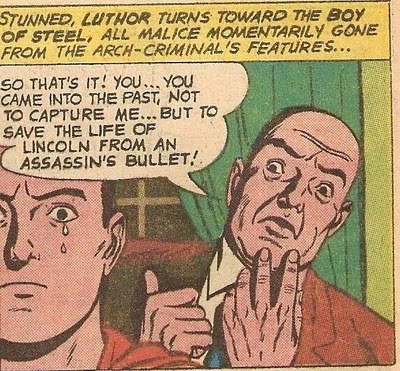
Luthor is genuinely sad that he stopped Superboy from preventing the assassination of Abraham Lincoln.
"The Impossible Mission," Superboy #85, December 1960, script by Jerry Siegel, art by George Papp.
Published on February 16, 2014 21:25
February 8, 2014
Movies I Watched in January
It's a rare month when I make it to an actual theater (!) to see actual movies aimed at actual grown-ups (!!), but in the first month of 2014, I accomplished that amazing feat not once but twice. Here's how it all went down...
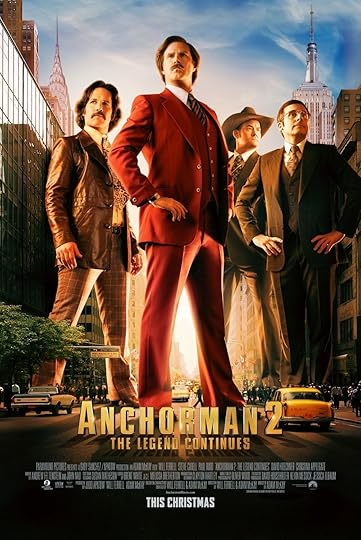
Started things off with a New Year's Day viewing of Will Ferrell's latest. Not, as you've probably guessed/heard, quite as good as the original, but funny enough to pass the time. The giant battle at the end lacked the surprise of the fight in the original, but I had to admire the way the stakes kept getting raised in the most ridiculous ways, including a minotaur and the great John C. Reilly as the Ghost of Stonewall Jackson. Overall, though, I'd have to say my favorite bits involved Steve Carell's Brick Tamlyn. Hard to believe that, back in 2004, when the original "Anchorman" was released, he was just one of the guys from "The Daily Show." "The Office," "The 40-Year-Old Virgin" and "Despicable Me" were still in his future.
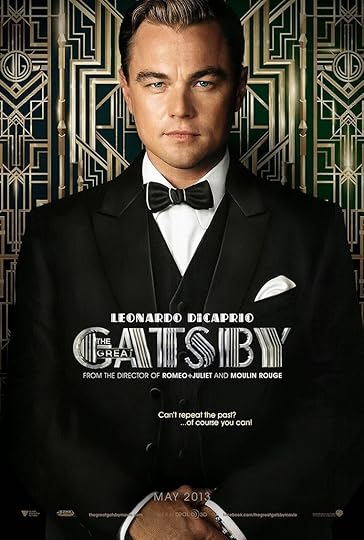
Though the book has been sitting on a shelf in my living room for more than a decade, I've never actually read F. Scott Fitzgerald's Jazz Age classic. My wife has, though (it's her copy), and she suggested we check out the Baz Luhrmann adaptation released to a big yawn earlier in the year. Maybe that's why I wound up liking the movie more than her. Amy said it had an annoying sentimental side that the book lacks, but I got caught up in the story and (most of all) in Luhrmann's over-the-top recreation of the 1920s. Coincidentally, it wasn't the only movie featuring Leonardo DiCaprio as a rich guy that I saw last month. As a matter of fact...
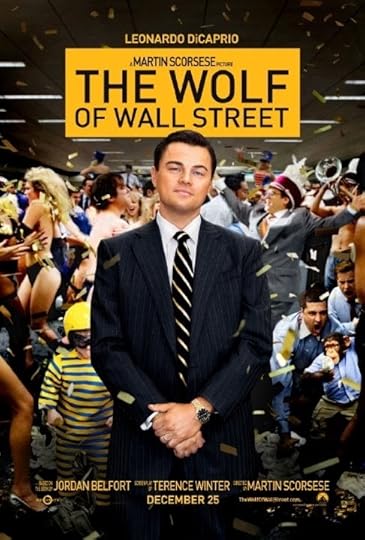
... I caught Leo's latest in the theater two days later and loved it. I've heard all the arguments against it -- that it's boring (really?), that it glorifies a scumbag like Jordan Belfort (hardly) and that it ignores the victims of his financial schemes (admittedly, it doesn't include them in the story, but anyone watching knows what he's doing, and anyway, that's not the movie Scorsese was making.) I thought it was, pure and simple, a thrilling and hilarious roller coaster ride delivered by a master filmmaker I'll admit I wasn't sure still had this sort of movie in him. (I was less than enamored with "Hugo.") And, as long as I'm praising the movie, let me add how much I love this poster. It's the perfect combination of calm, cool, collected DiCaprio standing front and center in the midst of the madness he's inspired. Great stuff.
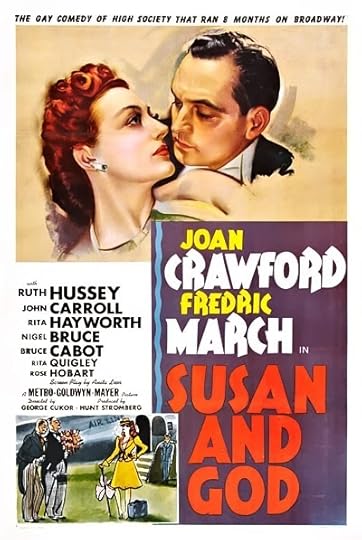
Here's an odd one that I caught (where else?) on Turner Classic Movies. Joan Crawford plays the title role (meaning Susan, in case you were confused), an image-obsessed woman married to booze-obsessed Fredric March. Joan becomes involved with a shallow, trendy religious movement (that, frankly, seems pretty light on religion) and soon ignores her family to please its leader. This is the sort of movie where Joan and Fredric's teenager daughter is made to look so deliberately unattractive that you just know when she takes off those glasses, loses that retainer and finally gets her hair done, she's gonna be the belle of the ball ... and that's exactly what happens. For a little while, I actually thought Fredric was going to give Joan the boot in favor of his much more appealing co-star, Ruth Hussey, but this being a movie with Joan Crawford's name on top, she and Fredric wind up together in the end. You do get to see some vintage footage of March's character drunk driving, which audiences must've found a lot more amusing back then. (Though I have to admit, the scene in "Wolf of Wall Street" with Leo trying to drive home with a belly full of 'luudes is pretty funny.)
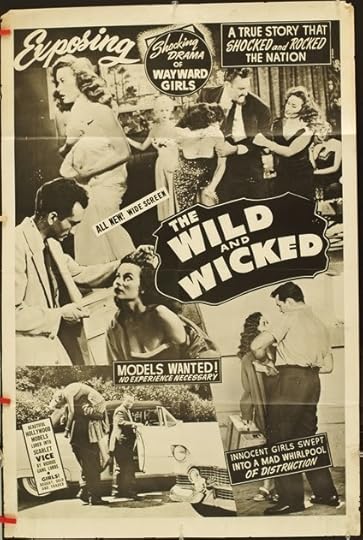
Another Turner Classics offering, this one airing in the middle of the night because the plot is a shade on the sleazy side: Naive girl from the heartland travels to Hollywood to find an acting gig like her sister, only to discover her sister is really -- gasp! -- a prostitute. This being a 1956 no-budget exploitation movie better known as "The Flesh Merchant," the actual act of prostitution is never mentioned by name and is only heavily implied with a series of awkward dance scenes and closed doors. It's not a very entertaining movie, even by no-budget exploitation standards, and if you do decide to watch it (it's available on a lot of bargain-priced DVD collections, you'll be glad it's only about an hour long.
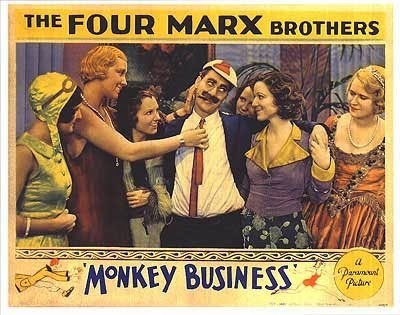
Allie's love of the brothers Marx continues, and she really got a kick out of this one. Her favorite character remains Harpo (which makes sense), and the scene where he disrupts a puppet show on a cruise ship practically caused her to pass out with laughter. My favorite joke this time around was part of a conversation between Groucho and Chico involving Groucho's mustache getting together with Chico's grandfather's beard. (Don't ask.) Groucho considers the relationship, asking if Chico's grandfather's beard has any money. Chico answers with the most perfectly innocent delivery of an awful pun in movie history. "Why he fell hair to a fortune!" Love it, love everything about it.
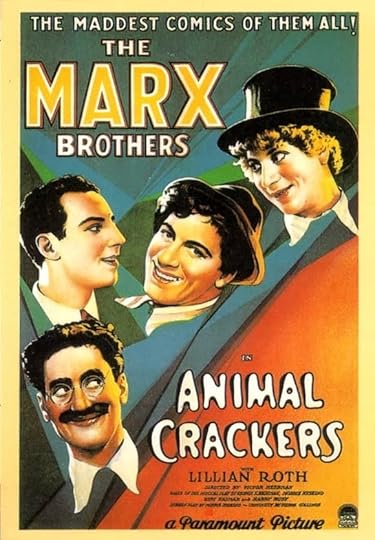
And then we watched this, the Marxes' second film. It's a big improvement over their first, "The Cocoanuts," which was made not only when they were new to movies, but when sound was pretty new, too. "Animal Crackers" is the first Marx Brothers movie I ever saw. It aired on TV when I was a kid, after being out of circulation for years, and my first encounter with the Marxes was one of those life-changing moments, like my viewing of "Star Wars" or my first reading of the old Mad comic books. Nowadays, with the benefit of seeing their later efforts, it's a little clunky, with WAY too much time and effort devoted to the love story subplot, but it still has some great moments: Groucho's "strange interludes" delivered to the camera, Harpo and Chico's card game with Margaret Dumont ("We just play for small stakes." "And french fried potatoes?") and Groucho's great description of his safari. ("We took some pictures of the native girls, but they weren't developed. But we're going back again in a couple of months...")
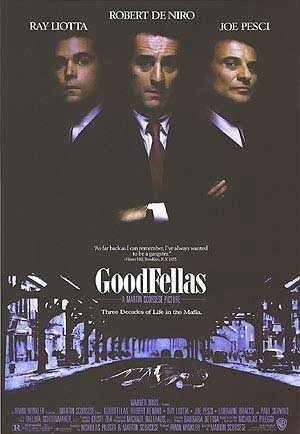
When I heard my pal Billy (whom I saw "The Wolf of Wall Street" with) had never seen this Scorsese classic in its entirety, I quickly organized a viewing. I don't think I've seen the whole movie in one sitting in years, but I'm happy to say it still holds up beautifully. It's an epic story made up of a million individual moments and shots, from the justly famous tracking shot into the Copacabana to the less renowned but still great slow tracking shot into De Niro's face as Creem's "Sunshine of Your Love" strikes the perfect ominous note. When people ask me what my all-time favorite movie is, I have a dozen different answers, but "Goodfellas" is always one of them. I saw it in the theater, and I've owned it on videotape, DVD (twice) and Blu-ray. And I could watch the whole thing again at the drop of a hat.
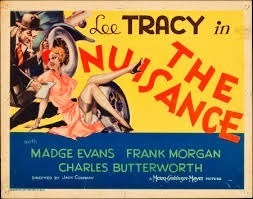
The great Lee Tracy stars in this pre-Code comedy that takes ambulance chasing to levels even today's sleazy shysters couldn't dream of. Tracy plays a lawyer whose speciality is rushing to the scenes of accidents (preferably those that involve a deep-pockets transit company) and, using shady doctor Frank Morgan (the Wizard of Oz himself!) to provide medical evidence, convinces the (usually unharmed) victims that they've suffered terrible injuries and that they deserve a day in court. Tracy's charisma helps get us on his side, of course, but something about living in this modern age of corporate dominance makes a viewer root for him to screw over those companies even if they are (mostly) innocent. As a bonus, Charles Butterworth is very funny as a perennial (fake) accident victim. His deader-than-deadpan delivery is the perfect counterpart to Tracy's high-energy style.

Started things off with a New Year's Day viewing of Will Ferrell's latest. Not, as you've probably guessed/heard, quite as good as the original, but funny enough to pass the time. The giant battle at the end lacked the surprise of the fight in the original, but I had to admire the way the stakes kept getting raised in the most ridiculous ways, including a minotaur and the great John C. Reilly as the Ghost of Stonewall Jackson. Overall, though, I'd have to say my favorite bits involved Steve Carell's Brick Tamlyn. Hard to believe that, back in 2004, when the original "Anchorman" was released, he was just one of the guys from "The Daily Show." "The Office," "The 40-Year-Old Virgin" and "Despicable Me" were still in his future.

Though the book has been sitting on a shelf in my living room for more than a decade, I've never actually read F. Scott Fitzgerald's Jazz Age classic. My wife has, though (it's her copy), and she suggested we check out the Baz Luhrmann adaptation released to a big yawn earlier in the year. Maybe that's why I wound up liking the movie more than her. Amy said it had an annoying sentimental side that the book lacks, but I got caught up in the story and (most of all) in Luhrmann's over-the-top recreation of the 1920s. Coincidentally, it wasn't the only movie featuring Leonardo DiCaprio as a rich guy that I saw last month. As a matter of fact...

... I caught Leo's latest in the theater two days later and loved it. I've heard all the arguments against it -- that it's boring (really?), that it glorifies a scumbag like Jordan Belfort (hardly) and that it ignores the victims of his financial schemes (admittedly, it doesn't include them in the story, but anyone watching knows what he's doing, and anyway, that's not the movie Scorsese was making.) I thought it was, pure and simple, a thrilling and hilarious roller coaster ride delivered by a master filmmaker I'll admit I wasn't sure still had this sort of movie in him. (I was less than enamored with "Hugo.") And, as long as I'm praising the movie, let me add how much I love this poster. It's the perfect combination of calm, cool, collected DiCaprio standing front and center in the midst of the madness he's inspired. Great stuff.

Here's an odd one that I caught (where else?) on Turner Classic Movies. Joan Crawford plays the title role (meaning Susan, in case you were confused), an image-obsessed woman married to booze-obsessed Fredric March. Joan becomes involved with a shallow, trendy religious movement (that, frankly, seems pretty light on religion) and soon ignores her family to please its leader. This is the sort of movie where Joan and Fredric's teenager daughter is made to look so deliberately unattractive that you just know when she takes off those glasses, loses that retainer and finally gets her hair done, she's gonna be the belle of the ball ... and that's exactly what happens. For a little while, I actually thought Fredric was going to give Joan the boot in favor of his much more appealing co-star, Ruth Hussey, but this being a movie with Joan Crawford's name on top, she and Fredric wind up together in the end. You do get to see some vintage footage of March's character drunk driving, which audiences must've found a lot more amusing back then. (Though I have to admit, the scene in "Wolf of Wall Street" with Leo trying to drive home with a belly full of 'luudes is pretty funny.)

Another Turner Classics offering, this one airing in the middle of the night because the plot is a shade on the sleazy side: Naive girl from the heartland travels to Hollywood to find an acting gig like her sister, only to discover her sister is really -- gasp! -- a prostitute. This being a 1956 no-budget exploitation movie better known as "The Flesh Merchant," the actual act of prostitution is never mentioned by name and is only heavily implied with a series of awkward dance scenes and closed doors. It's not a very entertaining movie, even by no-budget exploitation standards, and if you do decide to watch it (it's available on a lot of bargain-priced DVD collections, you'll be glad it's only about an hour long.

Allie's love of the brothers Marx continues, and she really got a kick out of this one. Her favorite character remains Harpo (which makes sense), and the scene where he disrupts a puppet show on a cruise ship practically caused her to pass out with laughter. My favorite joke this time around was part of a conversation between Groucho and Chico involving Groucho's mustache getting together with Chico's grandfather's beard. (Don't ask.) Groucho considers the relationship, asking if Chico's grandfather's beard has any money. Chico answers with the most perfectly innocent delivery of an awful pun in movie history. "Why he fell hair to a fortune!" Love it, love everything about it.

And then we watched this, the Marxes' second film. It's a big improvement over their first, "The Cocoanuts," which was made not only when they were new to movies, but when sound was pretty new, too. "Animal Crackers" is the first Marx Brothers movie I ever saw. It aired on TV when I was a kid, after being out of circulation for years, and my first encounter with the Marxes was one of those life-changing moments, like my viewing of "Star Wars" or my first reading of the old Mad comic books. Nowadays, with the benefit of seeing their later efforts, it's a little clunky, with WAY too much time and effort devoted to the love story subplot, but it still has some great moments: Groucho's "strange interludes" delivered to the camera, Harpo and Chico's card game with Margaret Dumont ("We just play for small stakes." "And french fried potatoes?") and Groucho's great description of his safari. ("We took some pictures of the native girls, but they weren't developed. But we're going back again in a couple of months...")

When I heard my pal Billy (whom I saw "The Wolf of Wall Street" with) had never seen this Scorsese classic in its entirety, I quickly organized a viewing. I don't think I've seen the whole movie in one sitting in years, but I'm happy to say it still holds up beautifully. It's an epic story made up of a million individual moments and shots, from the justly famous tracking shot into the Copacabana to the less renowned but still great slow tracking shot into De Niro's face as Creem's "Sunshine of Your Love" strikes the perfect ominous note. When people ask me what my all-time favorite movie is, I have a dozen different answers, but "Goodfellas" is always one of them. I saw it in the theater, and I've owned it on videotape, DVD (twice) and Blu-ray. And I could watch the whole thing again at the drop of a hat.

The great Lee Tracy stars in this pre-Code comedy that takes ambulance chasing to levels even today's sleazy shysters couldn't dream of. Tracy plays a lawyer whose speciality is rushing to the scenes of accidents (preferably those that involve a deep-pockets transit company) and, using shady doctor Frank Morgan (the Wizard of Oz himself!) to provide medical evidence, convinces the (usually unharmed) victims that they've suffered terrible injuries and that they deserve a day in court. Tracy's charisma helps get us on his side, of course, but something about living in this modern age of corporate dominance makes a viewer root for him to screw over those companies even if they are (mostly) innocent. As a bonus, Charles Butterworth is very funny as a perennial (fake) accident victim. His deader-than-deadpan delivery is the perfect counterpart to Tracy's high-energy style.
Published on February 08, 2014 09:08
Will Pfeifer's Blog
- Will Pfeifer's profile
- 23 followers
Will Pfeifer isn't a Goodreads Author
(yet),
but they
do have a blog,
so here are some recent posts imported from
their feed.



